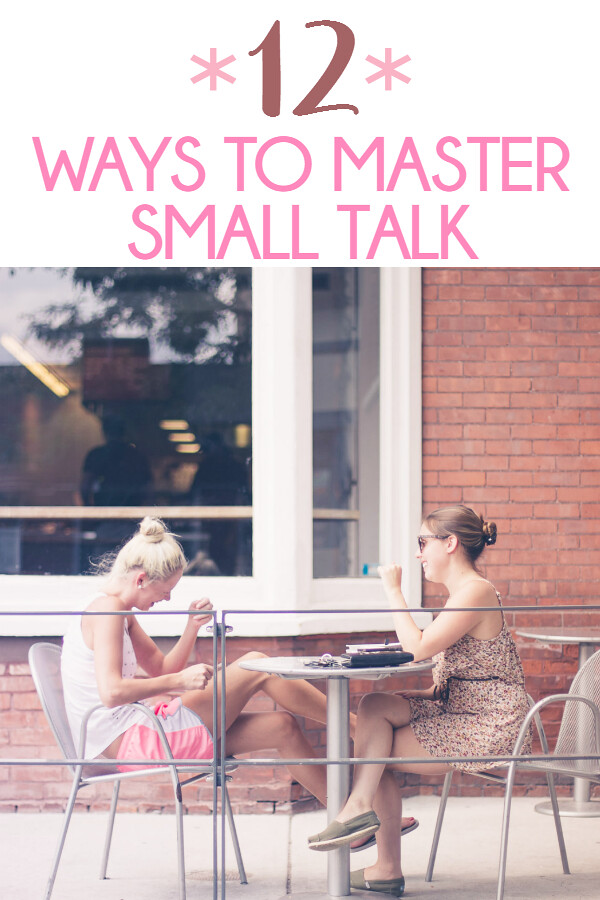If there’s one thing you will be forced to take part in no matter what age you are, it’s small talk. Learn how to master small talk and you shall prosper. Well, probably. It takes two people to have a conversation (unless you’re talking to yourself), so remember you can only do so much when it comes to good conversation.
Lately, I’ve been preparing for a lot of small talk. Next weekend I’ll be attending a wedding as a plus-one date and a few weeks later I’ll be starting a new internship and meeting plenty of new people. Small talk is often dreaded, but it’s necessary and easy once you get the hang of it.
1. Make eye contact.
Duh. If it’s a bit difficult to keep prolonged eye contact, you can also stare just above the other person’s eyes. If you’re a bit adverse to eye contact, at least avoid looking behind the person. It looks like you’re seeking someone better to talk to or looking for an escape.
2. Monitor your body language.
Whether you’re sitting down or standing, your body should be angled towards the people you’re talking to. Ensure you’re not leaning your head on your hands, playing with your hair or anything of that sort. Body language conveys a message and if you’re playing with your hair and your body is angled towards the wall, it sends a bad message.
3. Expand on basic answers.
Most people ask the same ‘old questions. Don’t give the same ‘old answers. Ensure your answers allow for further conversation rather than cutting it short. If you simply answer “Good” to the popular questions you’re creating a conversational dead end and a lot of room for awkward silences.
Examples:
How’s school going?
- It’s going well! I actually just started taking a course on *INTERESTING TOPIC*.
- Not too bad, I’m getting really excited for spring break. My friends and I have *TRIP* planned.
- Pretty well! I heard you were an alum there!
How are you?
- Busy! I just started a new project about blah blah.
- Well, I’m happy to be home. I really missed *local place* Have you been?
- Pretty good! I’m excited, I actually heard this place serves the best lobster in town!
Feel free to exaggerate a little bit if necessary. Don’t go crazy with exaggerations and don’t get too dark. If you choose to get a little bit dark, try to add some humor. “I’m doing horribly.” is way different from “I’m not great! I got splashed by a huge puddle this morning, I looked like I just swam across the Hudson River and got struck my lightning!” Keep it a little light, save your dark lord remarks and rants for your friends and family.
4. Don’t get overly personal.
Remember, it’s small talk, not a therapy session or a heart to heart. Definitely, share things and encourage the sharing of things but don’t get overly detailed or emotional. Keep it light.
5. Avoid taboo topics and expertly work your way out of them if the other person brings it up.
Again, duh, you shouldn’t bring up religion or politics or money during small talk. Sometimes the other person brings it up, however, and you should learn how to expertly and politely work your way out of it.
You can be blunt and say, “Oh, I make it a point not to talk about *TOPIC* at the dinner table!” You can make a joke and say, “Oh man, this sounds like Thanksgiving with the family. Too many traumatic memories, let’s talk about the beautiful bride instead.” You can also simply steer the conversation. If someone says, “I can’t believe Trump did *INSERT THING*!” you can say, “Yeah. That is pretty crazy. I also saw in the news that the baby giraffe was finally born! Have you seen him yet?”
6. Learn how to exit a conversation gracefully.
Sometimes the conversation is dead or you just want to get the hell out. Avoid being rude at all costs. If you’re with someone you can try using telepathy to get them to rescue you. If not, wait until they finish a thought and then utter one of the usual lines: “Well, I’m so glad I got to meet you/see you again!” or “I’m so glad we got to catch up” followed by:
- I’m going to make some rounds. I’m sure we’ll chat again before the night is over.”
- I better go say hello to *insert name or family member* or they’ll kill me! *Light laughter*
- I’m going to explore the venue/event a bit, but I’m sure I’ll be back!.
- I’m going to scope out the buffet/auditorium/etc, I’ll see you in a bit.
7. When in doubt, ask about them.
This will always make you look good. Other people generally enjoy talking about themselves, their passions and their opinions. The only catch is to make sure you’re listening or, at least, giving the cues that you’re listening. Nod your head, ask follow-up questions and emotionally react to what he or she is saying.
Some questions to ask someone might be:
- What do you think of *the food/the music/this place/the last speaker*?
- Where did you get that *bag/shirt*? I love it!
- Where are you from?
- I heard you work as a *job*! That’s so interesting, how is it?
8. Only compliment if it’s genuine.
Compliments are great and can help foster conversations and positive impressions, but they should only be used if they’re genuine. Typically, when you give compliments they should have more substance. For example, instead of “I like your outfit.” a better compliment may be, “Your outfit is amazing. I love how you styled the shoes. Are they Kate Spade?” or “Wow, Jessica was right! Your apple pie is the best apple pie on the east coast. What’s your secret?”
9. Curb complaints or make them light.
I’m a natural complainer, but when it comes to small talk it’s best to keep them light or nonexistent. You don’t need to suddenly become Queen of Optimism but you want to avoid giving off the impression of being a Negative Nancy. Turn, “It’s so hot in here! They need to turn up the air conditioning oh my gosh” into “It’s so warm in here! It feels like summer again, I miss summer.” Or, just keep them to a minimum.
10. Gauge the sense of humor before cracking jokes.
If you’re someone who constantly relies on sarcasm and stupid jokes, ensure your humor will be well received by testing the waters before going wild. Try a small joke and see the reaction to see if that type of humor is good. Don’t turn this into a standup routine but do naturally incorporate humor if it’s well-received.
11. Bounce off of the common ground.
Even if you know nothing about the person you’re speaking to, you can use the place/event you’re at as common ground. Ask them how they found out about it/who they know/what they’re excited for/how the ride was, etc. You might even notice his or her bag is Kate Spade who’s your favorite designer and you can mention that.
This is always a safety net. This is especially easy in restaurants where you can mention something that sounds amazing on the menu or a Yelp! review you read.
12. Actively involve others in the conversation.
This is just a great way to not be an asshole and it’ll give you some good karma. Plus, having more people involved in the conversation can also help take some of the pressure off of you.
A nice way to do this is if you notice someone nearby alone or loitering near your conversation. Ask their opinion. For example, if you’re all discussing the chicken parmesan, look at that person and ask, “Hey! What do you think? I think it’s great but Joe disagrees” or “What did you think of that exam?” A lot of people really appreciate being included.
What do you do to master small talk?








Good ideas! I definitely think it’s important not to get too personal in a passing conversation – if you only have a few minutes to talk to that person, keep it light and make time for deep conversations later.
Madison // http://www.madsmaybe.com
Thanks, Madison! I agree, sometimes it can get sort of awkward if things get too deep too quickly